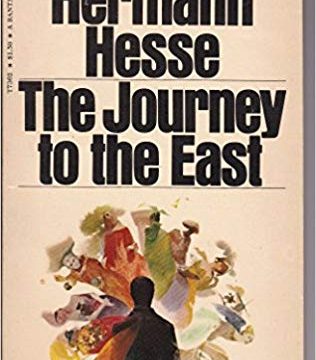One of Hermann Hesse’s weirdest novels, Journey To The East is a trip through magical realism, Eastern parable, and an entirely metaphysical Recognition. Where many stories hinge on the “Admit you’re evil” moment but in a physical, tangible sense – your actions have led you to this fate – the ending for the protagonist of Journey is closer to that of Greek myth and Zen wisdom. He takes on tasks and labors to prove his worthiness and ultimately fails them…yet the ending suggests that all of this was necessary for the enlightenment of others. His failure is needed for the greater cause.
The novel details an ancient society who continually journey to a location in the East to find enlightenment. Don Quixote and Mozart among others are listed as members – the book takes the entire insane premise as a given and even hints that no one actually makes it to the East. The narrator and “hero” H.H. writes years after the servant of his traveling party, Leo, disappeared en route. The party collapses into distrust and paranoia shortly after and H.H is left disillusioned and bitter. What he eventually discovers to his horror is that he was the only one who truly abandoned the Cause and that ultimately he can’t make the sacrifices required for the journey, resulting in an ambivalent and provocative final scene.
The influence of Buddhism is absolutely palpable throughout here, as well as the unfinished novel Mount Analogue, also detailing a sacred expedition towards a holy location. (Leo’s eventual reappearance also brings to mind a trope throughout Western and Eastern culture and especially the Fisher King myth: the wise man disguised as a fool or beggar.) What Eastern religion and philosophy gave Hesse was a sense of playfulness towards narrative and reality, seen over and over in his fiction – the entire second half of Steppenwolf may be a hallucination and it doesn’t much matter. Half of the members of the Society are fictional yet here they are, leading the way. This gives his books a metaphysical dimension that can be described as psychedelia, years ahead of its emergence in popular culture. What happens here does not matter as much as what it means.
Ultimately the novel details a protagonist, much like Steppenwolf and Siddhartha, discovering their own meaning and coming to grips with the harsh reality of it. H.H does not contain in himself the values needed for Enlightenment: humility, the abandonment of the ego, and inner strength. He is the ultimate Westerner, only interested in a prize and not the experiences and growth that may come with seeking it. The final page suggests that while he can’t come to enlightenment, he can at least come to an understanding of his role in the Society and his contrast to Leo. H.H at last becomes an Archetype, a part of the greater story.
“Timely” is a bullshit positive attribution to give to a work – Rowan & Martin’s Laugh In was “timely”and what that really meant was the jokes didn’t always work fifty years later. Journey To The East resonates decades after publication because it speaks to our longing for peace and purpose, for a cause to believe in. Occupy Wall Street faded away and I still remember the power of being a part of a collective movement. Hesse simply twists that feeling 180 degrees and it results in an unsettling novella that has stayed in my mind since I finished it. Humans will always seek serenity (“You are okay,”) or paradise without recognizing their own need to put in the work, to actively change themselves. That flaw in us endures and so will Journey To The East in an age of extreme anxiety and creeping panic.


